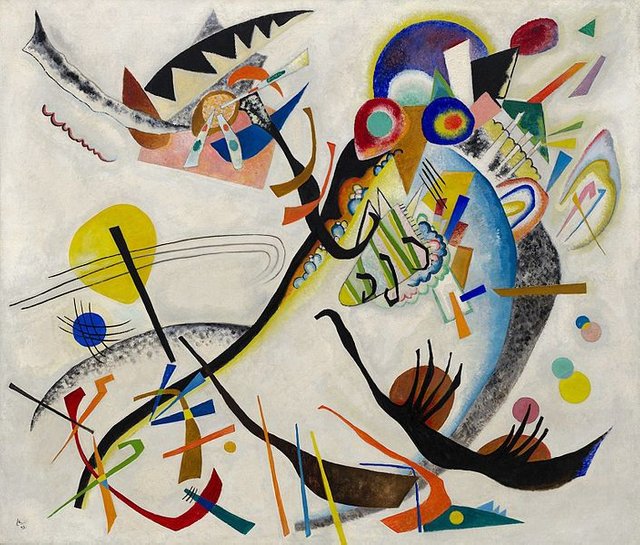Poema do amor azul (Português, Español & English Versions)
Poema do amor azul
O mar Atlântico abre as suas asas de gaivota
Perco-me em ti, em ondas da amor azul
A suave espuma trazida pela brisa da tarde
Rebenta-me aos pés, arrepiados de cor
Trazias o teu vestido de linho branco
Como as penas das andorinhas-do-mar
Desfazias-me em luzes e pôres-de sol
Bronzeando o meu coração de arco-íris
Nas areias desta praia luminosa e feliz
Colocaste-me na boca a música da palavra
Nas mãos, a escultura do teu corpo
Pelicano que voa entre duas margens
Olhar sobre o horizonte salgado.

(Image: Vassily Kandinsky, 1921 - Segment bleu, Wikimedia Commons)
Versión en Español:
Poema del amor azul
El mar Atlántico despliega sus alas de gaviota
Me pierdo en ti, en olas de amor azul
La suave espuma que trae la brisa de la tarde
Estalla a mis pies que tiemblan de color
Trajiste tu vestido de lino blanco
Como las plumas de los charranes
Me deshacias en luces y puestas de sol
Bronceando mi corazón de arcoíris
En la arena de esta playa luminosa y feliz
Pusiste la música de la palabra en mi boca
En las manos, la escultura de tu cuerpo
Pelícano volando entre dos orillas
Mirada sobre el horizonte salado.
English Version:
Poem of love in cyan
The Atlantic Sea spreads its seagull's wings
I lose myself in you, in waves of cyan love
The soft foam brought by the afternoon breeze
Bursts at my feet that tremble with color
You brought your white linen dress
Like the feathers of terns
You unmade me into lights and sunsets
Tanning my heart in rainbows
On the sands of this bright and happy beach
You put the music of the word in my mouth
In my hands, the sculpture of your body
Pelican flying between two shores
Eyes over the salty horizon.
24.01.25 @hefestus
Author's note:
Oh, man! I tried an automatic translator and it definitely doesn't work the way it's supposed to. A lmost a day after the publishing I'm still finding huge fails in meaning and correcting them.
I apologise to the English readers for the inferior musical and rythmic sound of the poem, which I cannot reproduce, no matter how hard I try.
I notice the same. English lacks the words. Translating rarely works but it helps to understand what the text is about. Editing translations is a hell of a job.
🍀♥️
Yes it is, and lots of times, it's more work than writing the original. Occasionally, it also produces the miracle of making a author appear much better than he is, after being translated by a third person. :)
If it works out fine that writer is lucky but I rarely recognize my writing style which bothers me.
In that white linen dress, will you take her dancing? Salsa dancing?
It's a popular way to dress at the beach... But yes, why not take her dancing? Would be a good idea. :))
Oh, man! I tried an automatic translator and it definitely doesn't work the way it's supposed too. A lmost a day after the publishing I'm still finding huge fails in meaning and correcting them.
I apologise to the English readers for the inferior musical and rythmic sound of the poem, which I cannot reproduce, no matter how hard I try.
Don't worry, we survive. It's better not to change much in the translation since the original is visible.
We do, and I still wonder if being translated by someone different from the author isn't better, as we tend to put too much weight on translating our own intention, which usually is not what the reader gets. The reader tends to give new and better meanings to what we wrote. :)
@wakeupkitty.pal ,actually, I find the very pinnacle of the translator influence to be a portuguese writer, José Saramago, who was a Nobel Prize for literature laureate. I knew him personally, read most of his works, and I'll be damned if the prize did not come from the fact that the translations into french and english were absolutely not what he has written, in either manner, shape or form, because he was unreadable in portuguese and the translators had to give some meaning to the text, by making it readable, i.e., adding punctuation and translating vague wording into very definite one. Some of the works receieved more that one translation into spanish and french, and you can actually dicuss which one, between them is the furthest from the original.
Anyway... That's only my opinion and, as they say, I'm not qualified to have it. :)
After this experience, I decided I'm not publishing anymore poetry, translated into different language families. It's too much of a bother and I can't expect to get a good result. I'll just write the piece in whatever language I feel like and then, enjoy the surrealism of the comments that will come out of readers reading the auto translated version. :D
You can do that but keep in mind that most communities have a language and those rules should be expected. Also keep in mind that not everyone is able to translate. At times I add the translation and write: lousy translation by google ... I don't even write google with a capital letter which is because they don't deserve it, not a typo.
Interesting info you shared about José Saramago... lucky guy that the translator made him more readable and enjoyable. LOL